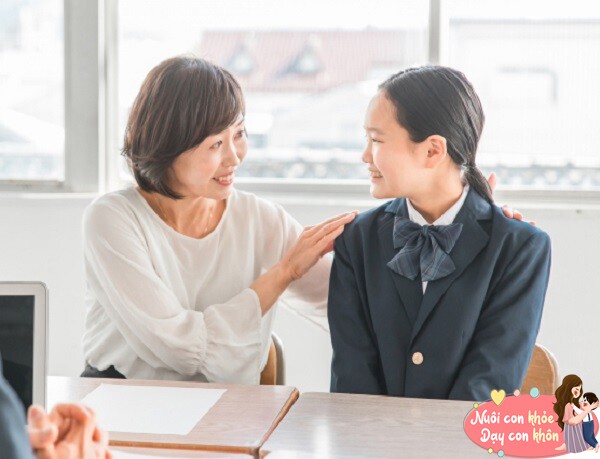As parents, patience, love, and understanding will help your child navigate this journey smoothly.

Listening is more important than lecturing
Listening is the first step in building a bridge of trust and is a great way to address a teenager’s problems.
Adolescence is an extremely important stage, not only for physical development but also for awakening self-awareness.
During this phase, teenagers often crave to be heard and understood. They not only seek guidance but also need a safe space to express themselves.

Listening is paramount.
Thus, the first thing parents should do is listen without judgment or interruption. This shows respect and fulfills the child’s emotional needs. When parents take the time to genuinely listen, children feel valued and tend to be more open about sharing their thoughts, confusions, and dreams.
When children sense attention and care from their parents, the trust between them strengthens, creating an environment where they can freely express themselves without fear of judgment.

Set boundaries instead of imposing control
Teenagers crave independence and start making their own decisions, even if these choices aren’t perfect in their parents’ eyes. This stage marks an important shift in their development, as they seek to assert themselves and express their individuality while seeking recognition from those around them.
It’s essential for parents to set reasonable boundaries that allow their children the freedom to explore without veering off course. These boundaries not only provide necessary safety but also teach children that there are limits to be observed in life.

Establish boundaries, not control.
However, this doesn’t mean that parents should control their children’s every action, as this will only provoke strong resistance. When children feel controlled, they may become rebellious and defiant, leading to conflicts. Instead, parents should establish family rules through open dialogue and involve their children in the self-management process. By jointly setting appropriate rules, children will feel they have a say and responsibility in the decisions, fostering their decision-making and self-reliance skills.
In this way, children will feel respected and be more likely to accept and adhere to the boundaries set.

Be a role model, not just a preacher
At this stage, children are forming their understanding of the world. They will develop their values and behavioral patterns by observing the people and things around them. During this developmental process, the influence of parents’ words and actions is paramount. Parents are the role models their children look up to and emulate.
Parents should strive to be exemplary, using practical actions to demonstrate how to face challenges, manage emotions, and maintain a positive attitude toward life. This is not just about teaching but also about invisible education, where children naturally learn from the way their parents communicate, react to difficult situations, and exhibit patience in daily life.
When parents demonstrate perseverance and optimism, children will instinctively sense it. These lessons aren’t just theoretical but become integral to their thinking, helping them face their own adolescent challenges in a similar manner.

Be a role model, not just a preacher.

Grow together instead of sacrificing alone
The challenges of adolescence are not just opportunities for children to mature.
Parents should recognize that navigating this journey with their children is a process of mutual growth and achievement.
Parents don’t have to play the role of unilateral sacrifice; instead, they should stand alongside their children as they explore life’s mysteries.
This means that parents need to continue learning and improving their emotional management skills, communication skills, and educational intelligence to better understand and support their children.
At the same time, parents also learn to let go, allowing their children to mature through challenges and mistakes, fostering resilience in the face of failures.
The path of adolescence is bumpy but also full of hope and potential. By listening, respecting, guiding, and accompanying their children with an open heart, parents can look forward to a brighter tomorrow.




































